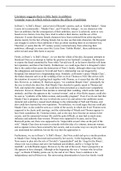Literature suggests there is little harm in ambition
Consider ways in which writers explore the effects of ambition
In Ibsen’s ‘A Doll’s House’, and several of Rossetti’s poems, such as ‘Goblin Market’, ‘Sœur
Louise de la miséricorde’, ‘Maude Clare’, and ‘From the Antique’, we see characters who
have an ambition, but the consequences of their ambition, once it is achieved, seem to vary
based on two factors- how they have tried to achieve their desires, and the sex of the
character. It seems that many female characters have been restricted from achieving their
desires merely for the fact of being female, but we also see that male characters like Krogstad
can struggle to achieve their ambitions if they go about reaching them in an immoral way.
Therefore, it seems that the 19th century society restricted many from achieving their
ambitions, although, in some cases like Lizzie from ‘Goblin Market’, these ambitions are
achieved and cause little harm to anyone.
Firstly, in Ibsen’s ‘A Doll’s House’, we see that the villain of the play, Krogstad, attempts to
blackmail Nora as an attempt to further his position in her husband’s company. He threatens
to expose the fraud committed by Nora while Torvald was ill, as he knows that this will harm
her reputation, and that of her family. Furthermore, we could argue that it is Krogstad’s letter
that is the catalyst that causes the destruction of Nora’s family, although others may feel that
the unhappiness and tension in Torvald and Nora’s relationship was not triggered by
Krogstad, but instead was a longstanding issue. Similarly, in Rossetti’s poem ‘Maude Clare’,
the titular character arrives at the wedding of her ex-lover Thomas to Nell. She arrives with
the intention (it seems) of getting back together with Thomas, as it seems that she still loves
him. However, as Anthony H. Harrison argues, “we condemn Maude Clare”, principally for
the way in which she does this. Had Maude Clare decided to quietly speak to Thomas and
Nell, and explain the situation, she could have been presented as a much more sympathetic
character- however, Maude Clare decides to interrupt their wedding, which seems rude and
untimely, and thus she appears as the ‘scorned woman’, and as Alice Kirby argues, could also
be seen as “symbolic of the fallen woman, and possibly pregnant”. Even if we do not feel that
Maude Clare is pregnant, the way in which she acts to try and achieve her ambitions seems
immoral and could have caused much damage to the relationship of Nell and Thomas, and
also could have harmed her own reputation. Nevertheless, we could argue that one could pity
Maude Clare, as she could be seen as a victim of the society in which she lived. Women were
supposed to be chaste until marriage, and the relationship of Maude and Thomas appears to
have been scandalous (by Victorian terms), and so she may have become an outcast in her
society, and for unmarried women life could be quite difficult, as men had so much more
influence and authority than women. Women were supposed to be pure, and as Greg
Buzzwell points out, there was supposed to be “impeccable sexual virtue on the part of the
wife”. Maude Clare does not seem to coincide with this idea of a virtuous, innocent woman,
and so appears to have been scorned by her society, and so in some ways we can pity her, and
can understand her ambition, but not the way that she approaches it.
Furthermore, we see in Ibsen’s ‘A Doll’s House’, that Nora could end up in a similar position
to Maude Clare- being disowned and scorned by her society. At the beginning of the play,
Nora seems to play into the role of Torvald’s “squanderbird” and the ‘Angel in the House’,
whose role was to please and serve her husband and children, and be a “refuge for her
menfolk”, as John Ruskin argues. However, by the end of the novel, Nora’s perspective on
life appears to have changed. Although at the beginning she was a “woman who loved her
cage”, as Sheila O’Malley points out, by the end of Act Three, Nora’s ambition is for
independence and self-discovery. Her unwavering determination to leave her family would




